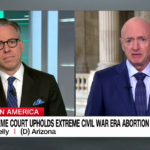
In Washington, Policy Revolves Around Joe Manchin. He Likes It That Way.
WASHINGTON — If Democrats eliminate the filibuster, there is one senator who would have an outsized impact in the 50-50 chamber on issues that could reshape the nation’s future: infrastructure, immigration, gun laws and voting rights. That senator is Joe Manchin III of West Virginia.
There is also a senator whose opposition to eliminating the filibuster is a significant reason it may never happen. That senator, too, is Mr. Manchin.
“He should want to get rid of the filibuster because he suddenly becomes the most powerful person in this place — he’s the 50th vote on everything,” said Senator Chris Coons, Democrat of Delaware, sketching out, though not embracing, the argument.
Mr. Manchin, however, does not see it that way. To the exasperation of Democrats, delight of Republicans and bewilderment of politicians who can’t understand why he wouldn’t want to wield more power, Mr. Manchin, a former governor of the state, isn’t budging.
“Sixty votes,” he said in an interview last week in his office, referring to the threshold required to advance most legislation, adding that he would not consider suspending the filibuster for certain bills, as some of his colleagues have floated: “You’re either committed or not.”
But with 18 people dead after two mass shootings within a week, a worsening migrant challenge on the border and Republicans trying to restrict voting in almost every state where they hold power, liberals believe this moment cries out for a different sort of commitment. At a time when they have full control of Congress and are confronting overlapping crises, many Democrats feel a moral and political imperative to act, process be damned.
That puts Mr. Manchin, 73, at the center of the most important policy debates in Washington — and has set the stage for a collision between a party eager to use its majorities to pass sweeping legislation and a political throwback determined to restore bipartisanship to a chamber that’s as polarized as the country.
Mr. Manchin believes that ending the legislative filibuster would effectively destroy the Senate. He recalled his predecessor, Robert C. Byrd, telling him that the chamber had been designed to force consensus.
Mr. Manchin has expressed willingness to support a “talking filibuster,” in which lawmakers have to actually hold the floor, perhaps for many hours, to block a vote. But he has not yielded on getting rid of it altogether and on an array of issues, including voting rights and gun control, his admonition is less about any particular policy end and more about making sure the legislation has support from both parties.
More broadly, Mr. Manchin’s resistance to ending the filibuster has ripened fundamental questions about which version of Congress would be more dysfunctional: a body stymied by gridlock or one that can pass legislation only by scrapping longstanding guidelines so it can push through party-line votes?
“You can’t make the place work if nothing significant is getting passed,” said Representative Ro Khanna, a leading progressive from California.
Mr. Manchin worries that the short-term benefit of ditching the filibuster would backfire for Democrats over the long term.
“I’m concerned about the House pushing an agenda that would be hard for us to maintain the majority,” Mr. Manchin said about the progressive legislation that House Democrats are stacking up at the Senate door. As for pressure from the left, he said, tauntingly: “What are they going to do, they going to go into West Virginia and campaign against me? Please, that would help me more than anything.”
To a growing number of his Democratic colleagues — and not just liberals — it’s naïve to keep putting hope over history, and believe, as Mr. Manchin said about gun legislation, that Republicans may say, “Listen, it’s time for us to do the reasonable, sensible thing.”
Of course, few in a Senate that depends on Mr. Manchin for a 50th vote will say outright that their colleague is indulging in fantasy.
“Joe’s focus, I believe, is bipartisanship, and I agree with the starting point,” said Senator Richard J. Durbin of Illinois, before lowering the boom: “They weren’t going to give us a single vote,” he said about the stimulus bill.
A former high school quarterback who friends say still relishes being at the center of the action, Mr. Manchin is something of a unicorn in today’s Congress. As a pro-coal and anti-abortion Democrat, he reflects a less-homogenized era when regionalism was as significant as partisanship and senators were more individual actors than predictable votes for their caucus.
Twice elected governor before claiming Mr. Byrd’s seat, he’s the only lawmaker standing in the way of an all-Republican congressional delegation in West Virginia, a state that former President Donald J. Trump carried by nearly 40 points last year. And he is an unlikely majority-maker of the Democratic Senate.
“We really are the big tent,” said Senator Debbie Stabenow of Michigan, before knowingly adding: “Now it’s a lot of work when you have a big tent, right? But that’s the way we have a majority.”
While out of step with his national party on some issues, and written off by parts of the left as little better than a Republican, his politics are more complex, even confounding, than they appear at first glance.
He provided the deciding vote on two of the biggest liberal priorities of this era — blocking repeal of the Affordable Care Act in 2017 and on passage of the nearly $2 trillion stimulus bill this month — while also twice voting to convict an impeached president wildly popular in his home state.
And while he may admire Mr. Byrd’s dedication to Senate tradition, Mr. Manchin has not emulated his predecessor by leveraging his power to focus relentlessly on steering spending projects back to West Virginia.
When Mr. Manchin was holding out on a single amendment that was delaying passage of the stimulus bill, White House aides were perplexed because his price for supporting the measure was not additional money for his impoverished home state. His main request, West Wing officials said, was to pare back spending and consider Republican input that could have made the bill appear more moderate.
Mr. Manchin said President Biden warned him in a phone call that the progressive left in the House might balk if the bill were significantly trimmed. “I said, ‘Mr. President, all we’re trying to do is put some guard rails on this,’” he recalled.
He was less happy about Vice President Kamala Harris’s effort to nudge him on the legislation by making an appearance on a television affiliate in West Virginia to promote the bill without forewarning him. The clip went viral and, Mr. Manchin said, prompted cleanup conversations with Mr. Biden and the White House chief of staff, Ron Klain.
As for any pressure that he may feel on the filibuster, Mr. Manchin said he had reminded Senator Chuck Schumer, the majority leader, of how essential he was to providing Democrats a majority.
He said he had told Mr. Schumer, “I know one thing, Chuck, you wouldn’t have this problem at all if I wasn’t here.”
Mr. Manchin’s resistance to eliminating the filibuster has drawn anger from many House Democrats, particularly those who see him as effectively prioritizing bipartisanship over Black voting rights.
He is not the only impediment to the sort of expansive liberal agenda preferred by many congressional Democrats or even the only one still defending the filibuster. Other Senate Democrats, including Kyrsten Sinema of Arizona, also share his reluctance.
Yet none are as eager as Mr. Manchin to restore a bygone day of collegiality. And perhaps, more to the point, none are as happy as him to talk about the need to do so as he navigates representing a once-heavily Democratic state that had been shifting to the G.O.P. even before Mr. Trump arrived on the scene.
He crossed the aisle last year to endorse his closest Republican ally, Senator Susan Collins of Maine, and is already co-hosting bipartisan lunches with her. He is plotting the post-pandemic restoration of his pizza-and-beer parties on the boat he calls home while in Washington. (It’s called “Almost Heaven,” the opening lyric to John Denver’s ode to West Virginia.)
Although some of his colleagues relish the ideologically-charged prime-time cable news programs, Mr. Manchin prefers another Washington institution that also flourished in less-polarized times: the Sunday morning show.
In the fashion of many former governors who grow exasperated with Washington’s glacial pace, at times he can barely contain his impatience. He’s repeatedly mused about leaving the Senate and trying to reclaim his old job in Charleston.
But those who know Mr. Manchin well believe he likes the attention that he receives in the capital, the same as he did as a signal-caller in Farmington, W.V., where he grew up near Nick Saban, the legendary football coach at the University of Alabama and a lifelong friend of Mr. Manchin.
“You’re in the hot seat when you’re a quarterback, but it’s pretty satisfying when you make progress,” said Nick Casey, a Manchin ally and former chairman of the West Virginia Democratic Party. Mr. Casey said the senator, who sustained an injury that cut short his playing days, was “the greatest QB who never got to start at West Virginia University — just ask him.”
Steve Williams, the mayor of Huntington, W.V., who served with Mr. Manchin in the state legislature, said: “This is the closest he has been to how he could be as governor, actually driving the agenda, pulling people together.’’
It’s the last part that most animates the senator. Happily bantering with reporters as he positions himself as a lonely, if well-covered, voice for comity, he shifts questions from policy to process.
“Why don’t you ask people when was the last time they took time to talk to some of the people on this side?” Mr. Manchin told a CNN reporter this week. “Try to convince them, or work with them. Have you had dinner with them? Have you had a lunch with them? Have you had a cup of coffee with them? Try something.”
A number of anti-filibuster Senate Democrats, though, are more focused on what Mr. Manchin’s support of the “talking filibuster” could portend.
“I think that gives us a lot of room for discussion,” said Senator Elizabeth Warren of Massachusetts, adopting a glass-is-half-full perspective.
What does seem clear is that Mr. Manchin is not going to switch parties.
“I don’t think that’s going to happen, although we’d welcome him with open arms,” said Ms. Collins, who has tried in the past to persuade her friend to join Republicans.
It’s not difficult to see why Mr. Manchin remains in his forefathers’ party. A Catholic of Italian descent, he sought John F. Kennedy’s desk when he arrived in the Senate, displays a picture of the slain president in his office lobby and can recall hearing that Massachusetts accent in his kitchen when Kennedy’s brothers came to his parents’ house during the West Virginia primary in 1960.
“Joe reminds me a lot of the old conservative Democrats in Texas,” said Senator John Cornyn, Republican of Texas. “They were born Democrats. They’re going to die Democrats.”
As for the filibuster, Mr. Coons, who was sworn in alongside Mr. Manchin in 2010, said liberals shouldn’t get their hopes up.
Recalling a conversation with somebody who knows Mr. Manchin well, Mr. Coons said this person told him: “If the ghost of Robert Byrd came back to life and said the future of West Virginia itself is on the line he might … think about it.”

















